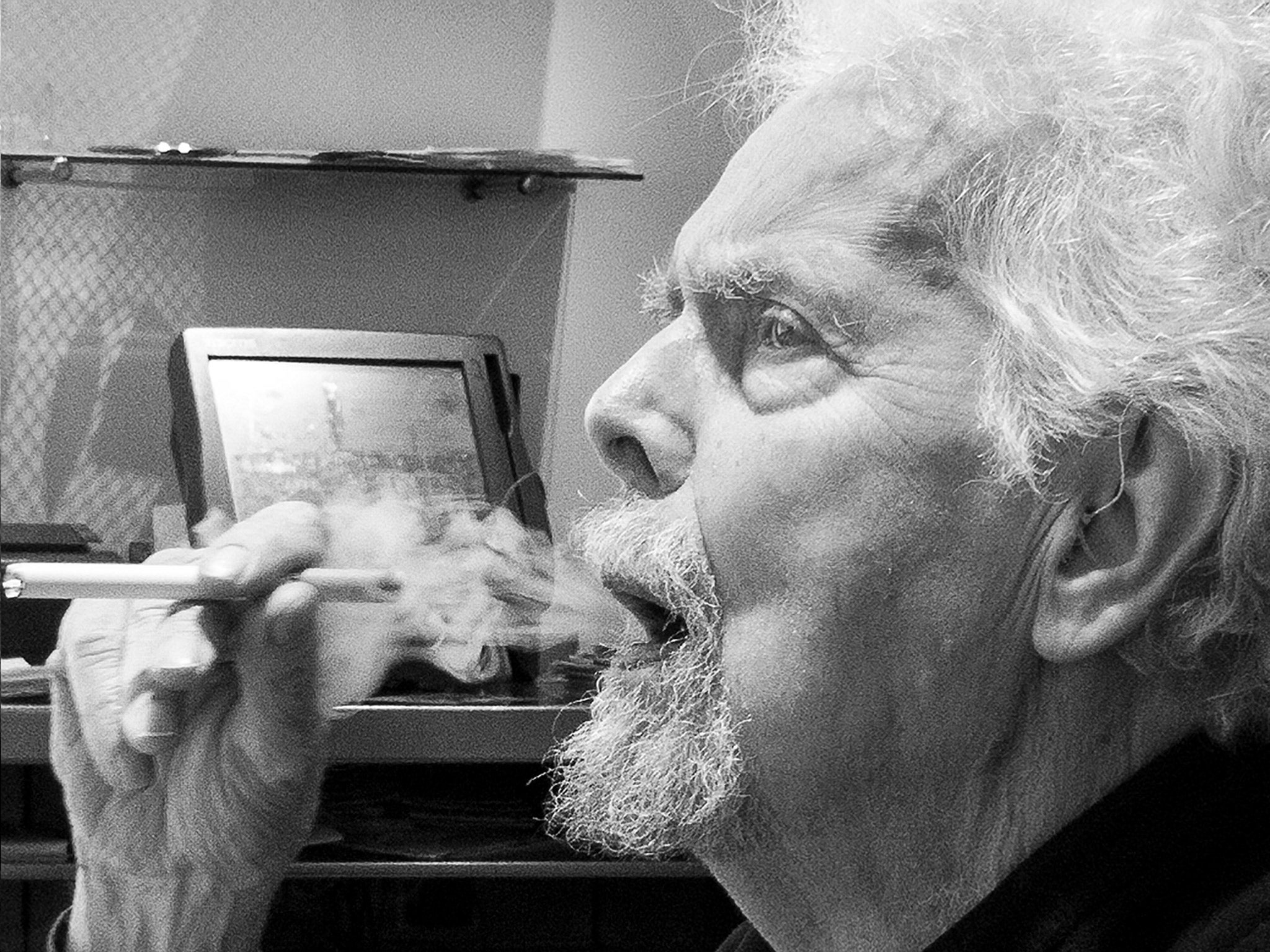
In a famous 1965 photograph he sits on the steps of the Albert Memorial behind Trocchi and Ginsberg. His hair is dark; his eyes slant. His clothes, as always, are black.
Anselm Hollo was a major poet, a prolific and fine translator and an inspiring teacher. His death is a loss to the world of letters and intelligence. He was born in Helsinki five years before the Winter War into a cosmopolitan and intellectual family. His professor father translated Cervantes, Dostoevsky and Henry James into Finnish, his mother taught music, his grandfather Paul, a chemist, invented the Walden Inversion. A visit to him in Germany as a small child left Anselm the memory of walking past Hitler's Reich-Chancellery. The home language was German. His sister taught him Swedish, his father Finnish, and by his early teens he was fluent in English and French.
In 1951 an American Field Service International Scholarship took him to Camp Rising Sun in upstate New York (where he met David Ball, a lifelong friend now also a poet, translator and teacher) and then to Cedar Rapids, Iowa. High school and polite Midwestern suburbia. His hosts thought Somerset Maugham "unsuitable reading". The books of Fennimore Cooper had given him a particular dream of America. This was not it.
Back in Finland, after interpreting at the 1952 Olympic Games, Hollo developed tuberculosis. From the sanatorium he went to convalesce in Germany with his grandfather. He stayed until 1957, when he met the actress Josephine Wirkus, and they married in Vienna. A handwritten application sent casually to the BBC led to a meeting with Martin Esslin and a job with the Finnish Section. The Hollos moved to London, where they lived for a decade and where their three children were born.
Although a small book of poetry had been published in Finnish Hollo decided that English would be his writing language. Poems appeared in the few small magazines trying to let a little light and air into the British poetry gloom. His first English books were published. By the mid-1960s he, his poetry and translations, were central to a shift in mood. He translated Brecht, Klee and young Russian poets into English; John Lennon and Ginsberg into Finnish; and with his wife, Corso and William Carlos Williams into German. The great Finnish poets Pentti Saarikoski and Paavo Haavikko were introduced to English readers. Hollo was deeply involved in the nascent small press movement and was a popular reader on the fledgling poetry circuit. Finnish listeners could hear his radio interviews with Rebecca West and Alan Sillitoe, his reviews of plays and films in London, and his dramatisation of The Man Who Would Be King. He was talented, intelligent and wild. In 1965 he read at the Albert Hall.
But America still beckoned. He taught a summer school at SUNY Buffalo, then was offered a more permanent position at the Writers' Workshop in Iowa City. Only a few miles away from his teenage experience, it was much more congenial. The International Writing Program brought old and new friends to town: Gunnar Harding from Sweden, Tomaz Salumun from Slovenia, Nicholas Born from Germany.
When Ted Berrigan arrived to teach, Hollo and he became close friends. During six years in Iowa his students included many now firmly established writers: Barrett Watten, Ray di Palma, Darrell Gray, Merrill Gilfillan and Alice Notley to list a handful. But Hollo was caught in a now-familiar trap. The MFA degrees his students earned left them qualified for jobs his lack of academic credentials barred him from.
So there was constant movement, teaching jobs for only one academic year: New York, Ohio, Michigan, Maryland, Minnesota, Virginia, Utah, California. A disintegrated marriage, alcohol, riotous times, crazy drives. In Paris he met Jane Dalrymple from Mississippi. They married and with her help he stopped drinking. In 1985 they moved to Boulder, Colorado where Hollo taught at Naropa University until he retired.
During all those years the books never stopped: translations of Genet, of Truffaut, of Rosa Luxemburg. Volumes of his own poetry up to and beyond Notes of the Possibilities and Attractions of Existence: Selected Poems 1965-2000. In 1996 he received both the Gertrude Stein Award in Innovative American Poetry and the Finnish Government's Distinguished Foreign Translator's Award. Eight years later the Academy of American Poets gave him the Harold Morton Landon Translation Award. He was secretly happy to live only a short drive from Buffalo Bill's grave.
Heart surgery did not slow him, but an operation for a tumour on his brain sapped strength. His spirit and energy carried him through a trip with Jane to England last spring. He was happy to visit his eldest daughter and granddaughter and gave a fine reading of his poems in London. But the tumour returned, and although he again survived surgery he became frail, though always mentally alert. A recent third recurrence of the tumour, and more surgery, proved too much. His family spent Christmas and New Year in the hospital with him. Lucid, he refused resuscitation and was taken home.
There are many who will always remember and miss his distinctive deep laugh, encouraging the good but nervous poet while savaging the banal and pretentious. "a strange / an isolate / sensibility // eternity / was / my address / then"
Tom Raworth
Paavo Anselm Aleksis Hollo, poet, translator and teacher: born Helsinki, Finland 12 April 1934; married 1957 Josephine Wirkus (marriage dissolved; one son, two daughters), secondly Jane Dalrymple; died Boulder, Colorado 29 January 2013.
Join our commenting forum
Join thought-provoking conversations, follow other Independent readers and see their replies
0Comments